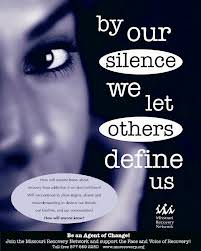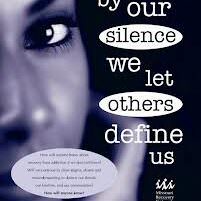Resource Library
Personal Privacy and Public Recovery Advocacy
 A central strategy of the new recovery movement is sharing our stories in public and professional venues to change public perceptions and public policies related to addiction and recovery. Drawing from earlier social movements, we learned that “contact strategies”—increasing personal contact between marginalized and mainstream populations—is one of the most effective means of reducing stigma and discrimination and expanding opportunities for full community participation. Public attitudes toward those recovering from alcohol and other drug problems become more positive when members of the public have positive exposure to people living in long-term recovery with whom they can identify.
A central strategy of the new recovery movement is sharing our stories in public and professional venues to change public perceptions and public policies related to addiction and recovery. Drawing from earlier social movements, we learned that “contact strategies”—increasing personal contact between marginalized and mainstream populations—is one of the most effective means of reducing stigma and discrimination and expanding opportunities for full community participation. Public attitudes toward those recovering from alcohol and other drug problems become more positive when members of the public have positive exposure to people living in long-term recovery with whom they can identify.
We also learned that there were limitations to this approach of public recovery storytelling. Changing personal attitudes of those exposed to our stories left in place much of the institutional machinery (e.g., laws, policies, and historical practices) that negatively affected individuals and families experiencing alcohol and other drug problems. Twenty years into the new recovery advocacy movement, discrimination against us remains pervasive. We must remain vigilant to prevent appropriation of our stories by others to support unrelated agendas. When this happens, we experience further marginalization.
People in recovery face discriminatory barriers in housing, employment, education, professional licensure, health care, and numerous arenas of public participation (such as voting and holding public office). Laws and regulations intended to protect us from discrimination remain unenforced. Addiction treatment remains of uneven quality, often lacking in long-term recovery orientation, and limited in its accessibility and affordability. Too many communities lack long-term recovery support services. And people in recovery continue to be excluded from meaningful representation within alcohol and drug and criminal justice policy discussions and decisions.
It is in this context that we must be clear about what our public recovery storytelling can and cannot achieve, and relatedly, who precisely is responsible for eliminating entrenched policies and practices that have such a direct impact on our lives.
There is a paradox within our anti-stigma efforts. We must challenge oppressive barriers to recovery and full participation in community life. As Frederick Douglass so clearly and eloquently stated, “Power concedes nothing without a demand.” Historical inertia and personal and institutional self-interests sustain structures of oppression until they are challenged. Who will pose such a challenge if not people in recovery? Yet the ultimate responsibility for dismantling discriminatory practices rests upon the shoulders of the systems within which such oppressive machinery continues to operate. The responsibility to eliminate discrimination rests with those who discriminate. By itself, telling the perfect recovery story will not end discriminatory practices.
So where does recovery storytelling fit into all this? Our stories are a means of humanizing addiction and recovery—a means of challenging the myths, misconceptions, and caricatures that have let others objectify and isolate us. Our stories are an invitation for people to reconsider the sources of and solutions to alcohol and other drug problems. Our stories are a means of building relationships that embrace us within the human family—as people who share the dreams and aspirations of others. Our stories, directly or indirectly, also constitute Douglass’ demand to change the structures that have prevented embrace of our humanity and rendered us people to be feared, shunned, or punished. This involves far more than changing people’s perceptions, attitudes, and behaviors toward those with lived experience of addiction and recovery. It involves identifying and eliminating the precise mechanisms (e.g., policies and practices) through which social shunning and discrimination have been institutionalized.
This is not to suggest that people in recovery have no role to play in this change process nor that we should passively embrace a victim status in the face of such systemic challenges. We can take responsibility for our own personal and family recovery, make amends to those we have harmed, and reach out to others still suffering. We can participate in recovery-focused research (to create a science of recovery that can challenge recovery misconceptions), participate in protests and advocacy efforts, offer our recovery stories in public and professional educational venues, and represent our lived experience within policy-making settings. Such actions have contributed to numerous positive changes.
Our stories possess immense power as long as we recognize our stories alone will not create recovery-friendly social institutions or recovery-inclusive communities. We must not allow our stories to stand as superficial window-dressings while discrimination remains pervasive, even among some of the very groups and institutions who on the surface support our storytelling. Our stories must support specific calls for institutional change. We must hold individuals and institutions that discriminate accountable until they eliminate such conditions.
How we craft and communicate our stories for public/professional consumption is an important element of this process of social change. Recovery advocacy organizations have a responsibility to prepare and support the vanguard of individuals who heed the call of this public story-sharing ministry. This includes building a community ethic that protects those who possess the bravery and privilege of sharing their recovery stories in public forums. Collecting our stories without meaningful dialogue about how our stories will be used and the protections we will be afforded is unacceptable.
This is the first in a continuing series of blogs on personal privacy and public recovery advocacy. We hope it will set recovery storytelling within a larger context. The remaining blogs will explore the risks of public recovery storytelling, the ethics of public recovery story sharing, and suggest guidelines on protecting personal privacy and safety within the context of public recovery storytelling. The impetus for this series comes from our knowledge of individuals who have experienced unanticipated harm related to their advocacy efforts.

